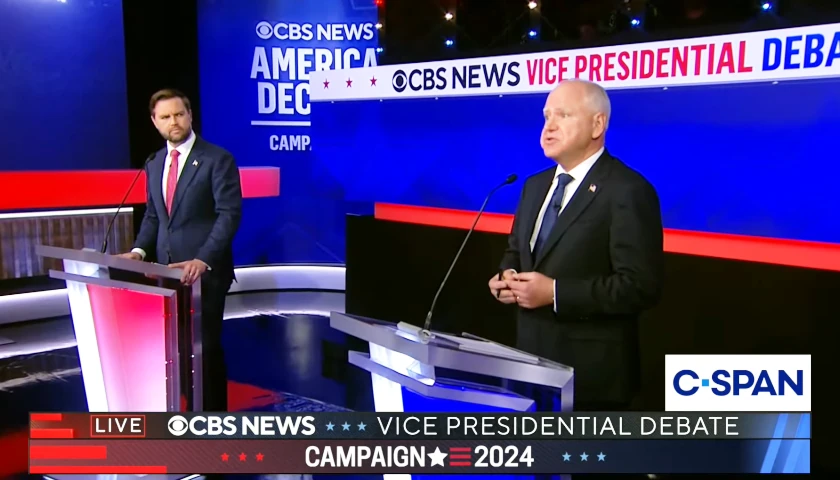Live from Music Row Wednesday morning on The Tennessee Star Report with Michael Patrick Leahy – broadcast on Nashville’s Talk Radio 98.3 and 1510 WLAC weekdays from 5:00 a.m. to 8:00 a.m. – host Leahy welcomed The Tennessee Star’s National Political Editor Neil McCabe to the newsmaker line reporting live from Farmington Hills, Michigan where he witnessed the disdain by school board members against parents unhappy with the 21-Day Equity Challenge curriculum. He later weighed in on the Build Back Better agenda status.
Leahy: We’re joined on our newsmaker line now by the best Washington correspondent in the country. Our national political editor who is on special assignment in Farmington Hills, Michigan, right now, Neil McCabe. Good morning, Neil.
McCabe: Michael, very good to be with you.
Leahy: So we sent you up to Farmington Hills, Michigan, because there was an important school board meeting. School boards all over the country are dealing with this issue of trying to push Critical Race Theory there.
That’s the school board where they have this 21-Day Equity Challenge. You were there on the ground. Parents protested. What did the school board say?
McCabe: First of all, I want to say that I’m grateful that you sent me there. I assumed you sent me there to freeze to death.
Leahy: (Chuckles) You’re very welcome.
McCabe: Yeah, it was something else. Dozens and dozens of parents showed up at this school board meeting because they found out that there was a program at the school called the 21-Day Equity Challenge, which basically was a program that incorporated Critical Race Theory into a curriculum that not only taught the students how to speak with politically correct language but told them that when they said that the United States was a land of opportunity, that this was offensive and it was actually a microaggression.
But there were also practical exercises that included telling the students that they needed to attend a Black Lives Matter event. And parents saw this and they were like, hold on. What’s going on at my school.
And what was fascinating to me is how many people at the school board, the superintendent, and teachers stood up against the teachers to let them know that they were wrong.
Leahy: What was the outcome of this? I got the kind of the impression that the parents show up and say, hey, this is wrong. And the school board said, we’re going to do it anyway. Is that kind of how it turned out?
McCabe: Yes. It wasn’t really the exercise and democracy that I think the parents were looking for. They were allowed to speak for two minutes, and when their two minutes were up, they were cut off. And then there were a lot of them. But the school board didn’t seem very moved.
And my guess is that this program is fairly well entrenched. The 21-Day Equity Challenge, I was surprised to learn when I dug into it for this story, it’s going on around the country. And there are schools, colleges, organizations. There’s a United Way based in Ann Arbor, Michigan, where in the last two years, more than 10,000 participants have gone through this challenge that’s run by the United Way.
Even the American Bar Association has its own program. And it’s all about converting people into a politically correct mindset. And the reason why they call it the 21-Day Challenge is that there’s this idea that if you want to form a good habit, it takes 21 days for your body and your brain to sort of develop those neuron endings to develop what is hoped to be a positive habit. But any habit basically becomes fixed if you do it for 21 days.
Leahy: This non-responsiveness to parents’ concerns about this seems to me, has translated into those political electoral successes for opponents like Glen Youngkin in Virginia who won an upset victory in the Virginia gubernatorial race.
Do you see the non-responsiveness of educational institutes to this legitimate concern from parents? Will that have any impact on the November 2022 midterm elections?
McCabe: Yes because I think what you’re really tapping into Mike, is this idea that there are non-political people who are suddenly triggered and energized. And there are people who had better things to do with their life than to spend three hours at a school board meeting.
But they felt compelled to do it because of what their kids were being taught in the school, and they really found it offensive. It really bothered them.
And these are people who are don’t particularly self-identify as Republicans or conservatives, but I think they’re going to find themselves in that camp. And it really shows that two months after Youngkin becomes the governor of Virginia, the left just doesn’t get the message. They think they can ride this thing out.
Leahy: And they’re doubling down. And Joe Biden kind of doubled down on a related theme. He went down to Georgia and basically called every Republican in Georgia a racist and said, you got to allow us to nationalize these elections so that we can cheat better.
And that’s basically what he was saying. That seems tone-deaf to me. The nationalization of the elections is before the U.S. Senate right now. What do you think is going to happen with that?
McCabe: Yes, that is going nowhere. And basically, Biden is putting down his marker. Biden is telling his diehards and his base that he’s committed, and this was all theater for them. And of course, the donors and the activists, they love it.
But nothing he said in Georgia is going to change a vote with Manchin or Sinema. And Joe Manchin, he’s already said, I don’t want to be bullied.
Why are you bullying me? Manchin is a tough guy. He was a running back for West Virginia, and he still thinks of himself as a football player. And he loves crashing the line. But he’s not going to lay down for anybody, not Joe Biden certainly.
Carmichael: Neil, this Crom.
McCabe: Hey Crom.
Carmichael: Here’s what’s confusing to me. I think that Biden’s support for this voting rights bill is somewhere between 25-30 percent of the population at most. How does it benefit them? Yes, they can raise money.
But how does that benefit them in the November election when they are that far away from about 70 percent of what the voters care about?
McCabe: Well, Crom, when you’re in the bubble, the bubble has its own logic. And the bubble that Biden finds himself in is a White House and a Capitol Hill leadership that is convinced that the public is with them. And the echo chamber that he’s in is not giving him any kind of signal that he’s being extreme or outrageous.
He’s just getting positive feedback. I’m sure after the speech he got on the plane and everybody said, great job, Mr. President. This is exactly what we needed to do. They are completely unaware of how it’s reading outside the room.
Leahy: So if that bill then doesn’t make it in the Senate, if they don’t get rid of the filibuster, which is what it looks like right now, what’s the next step for Joe Biden?
McCabe: He’s got to come to Jesus when it comes to the Build Back Better. He’s got to cut out the stuff that Sinema and Manchin don’t like. And he should be able to get something. Manchin said he just pulled his spending bill off the table.
But there are trillions of dollars that can be spent. And that’s really hard to walk away from. So we’ll see what they do. I’ve made the point before that Obamacare passed in March of 2010 after Scott Brown won his special election. So Democrats aren’t going to give up. Republicans can have victory dances and say it’s all dead and buried.
(Scoffs) But with the Democrats, it’s never dead and buried until somebody drives a wooden stake in its heart. The people with the wooden stake of the voters don’t rely on the Republican leadership.
Leahy: Where do you think we look right now? Of course, we’ll be doing this periodically. It’s January 12. The midterm elections will be the first week of November.
We got a long time. Almost 10 months between now and then. What do you think is going to happen in the midterms right now if you had to bet?
McCabe: Yes. I’m still looking at 40 or 60 seats picked up for the Republicans. I think there are three fairly easy pickups for the Republicans in the Senate. But in a wave election, there are people we never heard of.
There are races we never thought were tight that suddenly turn over. So you’re looking at five to six Republican pick-ups in the House. It’s interesting, because when Kevin McCarthy, the leader of the House Republicans says that he expects 30 Democratic retirements.
A lot of times what happens with retirement is the party tells a congressman you’re on your own. We can’t afford to protect you because we have to protect someone else. And these are guys who have maybe been self-funded.
Maybe they’ve funded other candidates in the past because they’re in fairly safe seats. But they’re basically told if you’re going to run this year, you’re going to have to raise your own money.
Leahy: And if they are on their own, they’re looking at it and saying, I think I’ll retire and get a cushy lobbying job. Neil McCabe, the best Washington Correspondent in the country national political editor for The Star News Network and The Tennessee Star thanks so much for being with us today. We’ll talk to you next Wednesday.
– – –
Tune in weekdays from 5:00 – 8:00 a.m. to The Tennessee Star Report with Michael Patrick Leahy on Talk Radio 98.3 FM WLAC 1510. Listen online at iHeart Radio.





